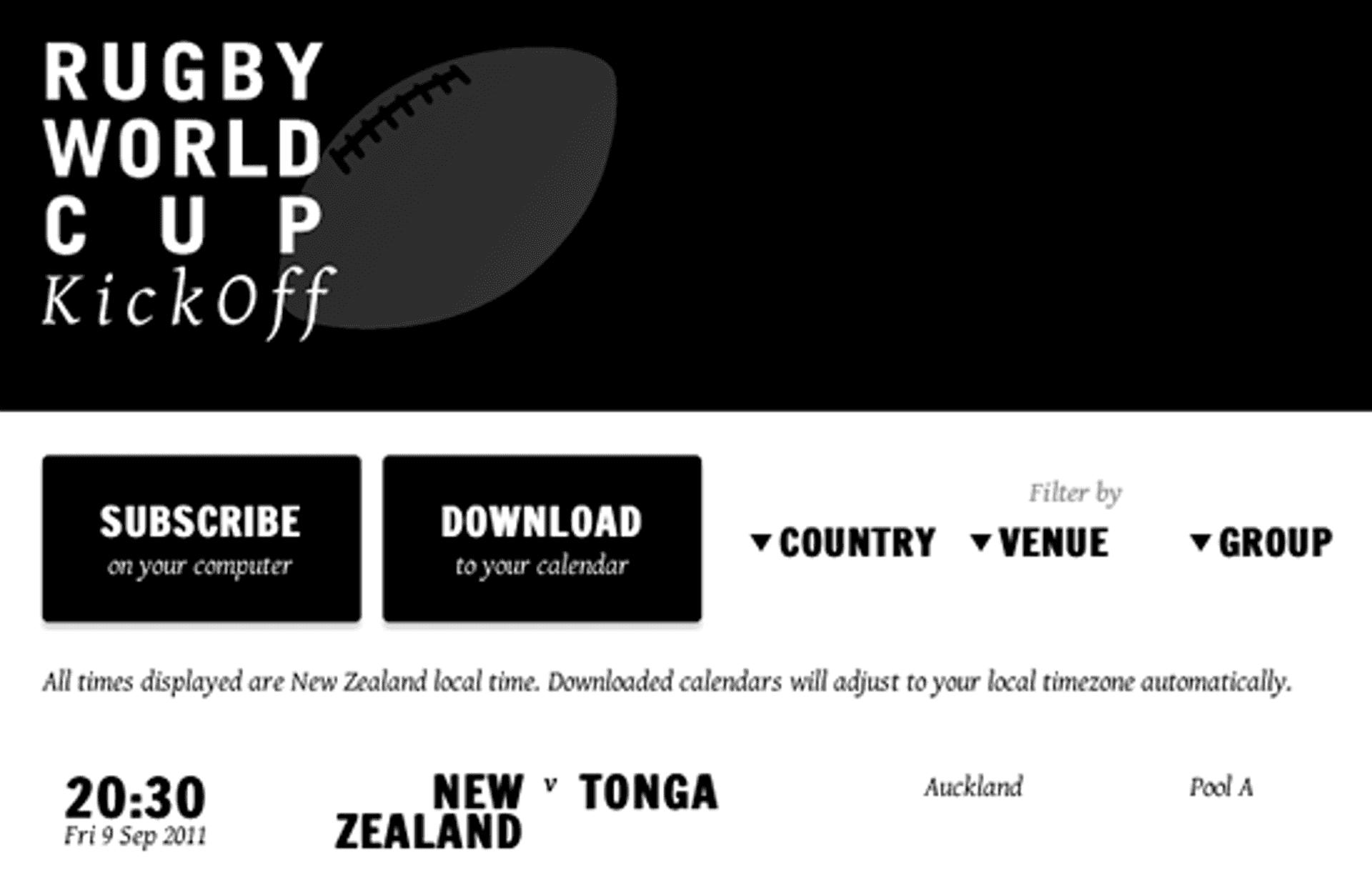Working against the clock is normally discouraged, especially when you have more than enough work on at the time. However, I often find tight deadlines are an ideal opportunity to test the old grey matter, push my abilities to the limit and, strangely, motivate me to try harder.
A classic example of this was building Rugby World Cup KickOff.

It was only after driving past our local Rugby School (the founding home of the sport) that I realised the Rugby World Cup was fast approaching. I had originally planned to cover the event with the usual KickOff calendar download app earlier in the year but other projects and clients took priority. That didn't phase me though. I had a working framework to reuse so development time was minimal.
That said, I drafted in some support from local developer Daniel Newns to help build some new features while I worked on a new design.
Improving the UI #
I was actually quite happy with the existing design and layout of World Cup KickOff from last year. The user interface focussed on the core functionality and information architecture seemed ideal.
The main change I wanted to make was extra emphasis on the actual kickoff time as a large amount of traffic to the other calendar websites showed visitors searching for just that. I also realised very few users were filtering events by date so decided to remove that option.
With regards to the general style, I wanted to keep the style minimal, avoiding typical cliché trends found online yet maintain the simple, retro style established on World Cup KickOff.
Equally, there had to be some reference to the competition host of New Zealand. With the country's squad known as the "All Blacks", this lent naturally towards the monochrome colour scheme. Whilst the style may feel somewhat flat, almost like a lo-fi wireframe, it allowed me to focus purely on the content and functionality without too much distraction. I can imagine some designers questioning the design decision but, hey, you can't please everyone.
Web Typography #
On recent projects, I've not had the opportunity to experiment with web fonts much so I decided this was an ideal situation.
There are a number of web font providers available such as Typekit and Fontdeck, but I decided to give Google Web Fonts a try taking into consideration costs and service availability.
After testing some font combinations, I decided on Francois One and Gentium Basic. The strength and weighting of Francois One represented the personality of rugby as a sport quite well, while the elegance of Gentium Basic reflected the traditional history of the game.
Release Early, Release Often #
I've recently changed my approach to development by releasing early and releasing often. When I discussed the project with Dan early on, we had some great ideas to improve the service with additional features.
That said, with time against us, I decided to launch the service as early as possible with the basic functionality, enhancing the user experience in a phased approach.
Working like this, we can adapt the roadmap according to user demand. We're monitoring the website traffic using services like GoSquared LiveStats,Google Analytics and Facebook Insights so we have a good idea of what visitors are looking at and for.
To help manage the project, I started using a few self-hosted open source solutions:
- Project Pier is a fantastic application for managing tasks, tickets, resources and clients. I've started using it with a few client and personal projects and found it perfect for collaborating on Rugby World Cup KickOff
- Web SVN is a neat little PHP app which allows you to keep track of Subversion repositories. You can even subscribe to updates via RSS which I've plugged into Growl with RSS Growler for desktop notifications.
We plan to roll out some Twitter integration shortly after launch as well as some extra content on the main website.
The Next Step #
Sport events are social occasions. They unite people together in a common interest and these people tend to have a lot to say on the matter. This is a perfect time to tap into social media.
Twitter has fast become the key communication tool of the internet, bypassing the "walled garden" of Facebook, allowing individuals to have a say in the public forum with ease.
With this in mind, I'm keen to harness the power of Twitter and sport events. The KickOff project has always been about embracing technology with sporting events, originally based on the ICS calendar format but since pushing the boundaries to other media formats.
The next natural step for the project is to embrace the community, allowing individuals to share their experience of an event, both online and offline.
We'll be experimenting with the Rugby World Cup and Twitter over the next few weeks and, going forward, a few more major sport events such as next year's big event, Olympics 2012 in London (although we have a few hurdles to jump "“ pardon the pun "“ regarding event publication).